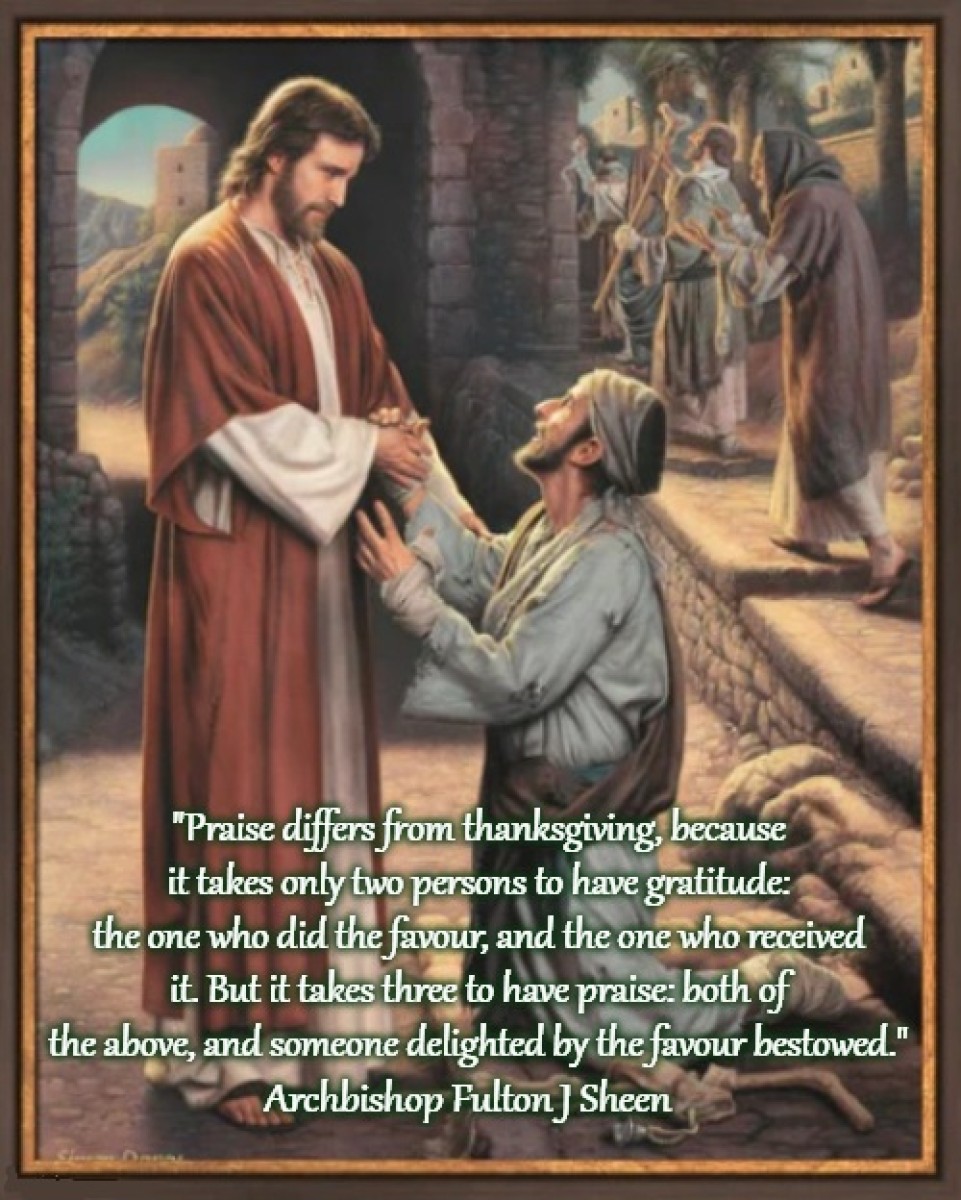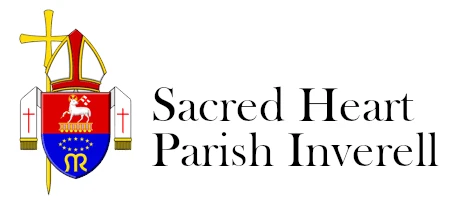28th Sunday in Ordinary Time (Year C) - 12 October 2025
12th October 2025

“We should spend as much time in thanking God for His benefits as we do in asking Him for them.” - St Vincent de Paul
A reflection on the theme of today's Gospel by the Venerable Archbishop Fulton J Sheen:
A very interesting phenomenon in children is that gratitude or thankfulness comes relatively late in their young lives. They almost have to be taught it; if not, they are apt to grow up thinking that the world owes them a living. How often grown sons and daughters after marriage and after some years spent in caring for their children, will say: ‘I never knew before how much love my parents put into raising me.’ Thanksgiving Day comes late in the year, and thanksgiving comes late in life.
St Paul had to teach his people gratitude to God by reminding them: ‘What powers hast thou, that did not come to thee by gift? And if they came to thee by gift, why dost thou boast of them, as if there were no gift in question?’ Some believe that one should not plant trees if their fruit cannot be eaten in one’s lifetime. This forgetfulness that others planted trees for the present generation is a kind of childishness.
The point here is not that children are naturally ungrateful, but rather that there is another attitude which precedes it, and that is praise. Though their parents have to be constantly telling them when to: ‘Say “thank you”,’ they never have to tell them to be enthusiastic about something which pleases them. They ignite quickly at the prospect of a bicycle, sweet, a picnic, or a toy. They run out and tell everyone in the road what they received. It may be a new dress the mother gave, or new football boots the father gave, or a trip they will make with their grandmother. Nothing so much cools off their burning ardour as the failure of someone to react warmly to the great things that have befallen them.
But what is praise? It is made up of two factors: first, a knowledge about something good or pleasurable or happy; second, an emotional inability to keep still about it. Secrets are hard to keep, because they are about something no generally known, and therefore destined to cause an interesting recoil. In this, praise differs from thanksgiving, because it takes only two persons to have gratitude: the one who did the favour, and the one who received it. But it takes three to have praise: both of the above, and someone delighted by the favour bestowed.
In a society which is as individualistic as ours, it is rather difficult to find people who thrill with the blessings which have come to others; if a blessing does not benefit us, it is generally ignored. Every egotist wants to talk about his own operation. He has no time either to listen to the story of another person’s illness, or to thank God for his own recovery. The egotists just want to boast about the length of their own incision, or how much money they inherited, or how many suits they own.
Those of us who are obliged to read all the Psalms every week, and do it gladly, are often struck by the fact that the prayers of Israel were rather songs of praise than thanksgiving. This is because the Israelites were not individualistic; they were members of a mystical corporation of a religious nation, and nothing that was received by one was without a blessing to another. The individual Israelite inherited all that belonged to Israel. They rejoiced as the body rejoices. If the tongue tastes something sweet and delectable, the whole organism seems to echo and reverberate with the pleasure. No cell in the body has ‘fun’ alone.
It would seem then that though thanksgiving or gratitude is noble, it was preceded historically by praise, as it is in children. More than that, it emphasised the charity, the brotherhood, the mutuality which binds men together. The Israelites instead of thanking for a favour, extended a blessing, as beggars are wont to do when they receive an alms. Every blessing brings God into it; every word of thanks does not.
Thus the noblest things in life have to be learned by effort, such as music and poetry. So does thanksgiving have to be taught to children, but even before they have learned to thank, they must learn to praise – to bless others and to praise God.
(The Power of Love)
Te Deum
You are God: we praise You;
You are God: we acclaim You;
You are the eternal Father:
All creation worships You.
To You all angels, all the powers of heaven,
Cherubim and Seraphim, sing in endless praise:
Holy, holy, holy, Lord, God of power and might,
Heaven and earth are full of Your glory.
You are God: we acclaim You;
You are the eternal Father:
All creation worships You.
To You all angels, all the powers of heaven,
Cherubim and Seraphim, sing in endless praise:
Holy, holy, holy, Lord, God of power and might,
Heaven and earth are full of Your glory.
The glorious company of apostles praise You.
The noble fellowship of prophets praise You.
The white-robed army of martyrs praise You.
Throughout the world the holy Church acclaims You:
Father, of majesty unbounded,
Your true and only Son, worthy of all worship,
And the Holy Spirit, advocate and guide.
The noble fellowship of prophets praise You.
The white-robed army of martyrs praise You.
Throughout the world the holy Church acclaims You:
Father, of majesty unbounded,
Your true and only Son, worthy of all worship,
And the Holy Spirit, advocate and guide.
O Christ, You are the king of glory!
The eternal Son of the Father.
When You became man to set us free
You did not spurn the Virgin’s womb.
You overcame the sting of death,
And opened the kingdom of heaven to all believers.
You are seated at God’s right hand in glory.
The eternal Son of the Father.
When You became man to set us free
You did not spurn the Virgin’s womb.
You overcame the sting of death,
And opened the kingdom of heaven to all believers.
You are seated at God’s right hand in glory.
We believe that You will come, and be our judge.
Come then, Lord, and help Your people,
Bought with the price of Your own blood,
And bring us with Your saints
To glory everlasting.
Save Your people, Lord, and bless Your inheritance.
Govern and uphold them now and always.
Day by day we bless You.
We praise Your name forever.
Come then, Lord, and help Your people,
Bought with the price of Your own blood,
And bring us with Your saints
To glory everlasting.
Save Your people, Lord, and bless Your inheritance.
Govern and uphold them now and always.
Day by day we bless You.
We praise Your name forever.
Keep us today, Lord, from all sin.
Have mercy on us, Lord, have mercy.
Lord, show us Your love and mercy;
For we put our trust in You.
In You, Lord, is our hope:
And we shall never hope in vain.
Have mercy on us, Lord, have mercy.
Lord, show us Your love and mercy;
For we put our trust in You.
In You, Lord, is our hope:
And we shall never hope in vain.
Art Credit: The Grateful Leper by Simon Dewey (available for purchase at altusfineart.com)


